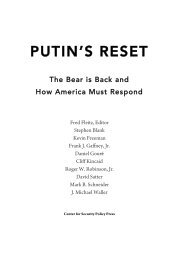Interest
Henry
Henry
You also want an ePaper? Increase the reach of your titles
YUMPU automatically turns print PDFs into web optimized ePapers that Google loves.
RUSSIA<br />
Klotsman was reportedly placed on a “top-ten<br />
list” of Americans that the Russians were willing<br />
to exchange for high-value Russian prisoners<br />
in U.S. custody, like the infamous arms<br />
dealer Viktor Bout. So far there have been no<br />
takers. But with Donald Trump as President,<br />
who knows?<br />
The Case of Iceland’s FL Group<br />
One of the most serious frauds alleged in<br />
the recent Bayrock lawsuit involves FL<br />
Group. FL Group is an Icelandic private investment<br />
fund that is really a saga all on its own.<br />
Iceland is not usually thought of as a major<br />
offshore financial center. It is a small snowy island<br />
in the North Atlantic, closer to Greenland<br />
than to the United Kingdom or Europe, with<br />
only 330,000 citizens and a total GDP of just<br />
$17 billion. Twenty years ago, its main exports<br />
were cod and aluminum—with the imported<br />
bauxite smelted there to take advantage of the<br />
island’s low electricity costs.<br />
But in the 1990s Iceland’s tiny neoliberal<br />
political elite had what they all told themselves<br />
was a brilliant idea: “Let’s privatize our stateowned<br />
banks, deregulate capital markets, and<br />
turn them loose on the world!” By the time all<br />
three of the resulting privatized banks, as well<br />
as FL Group, failed in 2008, the combined<br />
bank loan portfolio amounted to more than<br />
12.5 times Iceland’s GDP—the highest country-debt<br />
ratio in the world.<br />
For purposes of our story, the most interesting<br />
thing about Iceland is that, long before the<br />
financial crisis hit and utterly bankrupted FL<br />
Group, our two key Russian/FSU/Brooklyn<br />
mobster-mavens, Arif and Sater, had somehow<br />
stumbled on this obscure Iceland fund. Indeed,<br />
in early 2007 they persuaded FL Group to invest<br />
$50 million in a project to build the Trump<br />
SoHo in mid-town Manhattan.<br />
According to the Kriss lawsuit, at the same<br />
time FL Group and Bayrock’s Felix Sater also<br />
agreed in principle to pursue up to an additional<br />
$2 billion in other Trump-related deals.<br />
The Kriss lawsuit further alleges that FL Group<br />
(FLG) also agreed to work with Bayrock to facilitate<br />
outright tax fraud on more than $250<br />
million of potential earnings. In particular, it<br />
alleges that FLG agreed to provide $50 million<br />
in exchange for a 62 percent stake in the four<br />
Bayrock Trump projects, but Bayrock would<br />
structure the contract as a “loan.” This meant<br />
that Bayrock would not have to pay taxes on<br />
the initial proceeds, while FLG’s anticipated<br />
$250 million of dividends would be channeled<br />
through a Delaware company and characterized<br />
as “interest payments,” allowing Bayrock<br />
to avoid up to $100 million in taxes. For tax<br />
purposes, Bayrock would pretend that their actual<br />
partner was a Delaware partnership that it<br />
had formed with FLG, “FLG Property I LLC,”<br />
rather than FLG itself.<br />
The Trump Organization has denied any<br />
involvement with FLG. However, as an equity<br />
partner in the Trump SoHo, with a significant<br />
18 percent equity stake in this one deal alone,<br />
Donald Trump himself had to sign off on the<br />
Bayrock-FLG deal.<br />
This raises many questions. Most of these<br />
will have to await the outcome of the Kriss litigation,<br />
which might take years, especially now<br />
that Trump is President. But several of these<br />
questions just leap off the page.<br />
For example, how much did President<br />
Trump know about the partners and the inner<br />
workings of this deal? After all, he had a significant<br />
equity stake in it, unlike many of his<br />
“brand-name only” deals, and it was also supposed<br />
to finance several of his most important<br />
East Coast properties.<br />
For another, how did the FL Group and Bayrock<br />
come together to do this dodgy deal in the<br />
first place? One former FL Group manager alleges<br />
that the deal arrived by accident, a “relatively<br />
small deal” that was nothing special on either<br />
side. 25 The Kriss lawsuit, on the other hand, alleges<br />
that FLG was a well-known source of easy<br />
money from sources like Kazakhstan and Russia,<br />
and that other Bayrock players with criminal histories—like<br />
Salvatore Lauria, for example—were<br />
involved in making the introductions.<br />
At this stage the evidence with respect to<br />
this second question is incomplete. But there<br />
are already some interesting indications that FL<br />
Group’s willingness to generously finance Bayrock’s<br />
peculiar Russian/FSU/Brooklyn team,<br />
its rather poorly conceived Trump projects,<br />
and its purported tax dodging were not simply<br />
due to Icelandic backwardness. There is much<br />
more for us to know about Iceland’s “special”<br />
14 THE AMERICAN INTEREST



